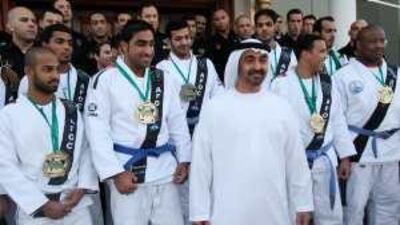ABU DHABI // Sporting heroes are being used to help spread awareness of diabetes as new research reveals that more than one in four people in the UAE have the disease or will develop the disease later in life.
Members of the UAE's national jiu-jitsu team will take part in a sports event in Al Ain as part of a health campaign called 'Towards a City Free of Diabetes.' Their appearance will be part of the 15th annual Al Ain Ramadan Soccer and Various Games Tournament, due to end on Friday (11). The programme is part of a three-year National Campaign Against Diabetes, launched earlier this year to raise awareness.
The national jiu-jitsu team had huge success at the World Professional Jiu-Jitsu Cup held in Abu Dhabi in April this year. It is hoped their presence at the Al Ain tournament will make the issue of diabetes more high profile as the government attempts to reduce the national rates of the disease. Research in Sharjah by Friends for Diabetes found 27 per cent had either diabetes or pre-diabetes from 3,936 people screened in July and August.
In the study, a third of the subjects were nationals, of whom 24 per cent had diabetes. Among the expatriate community, often excluded from such studies, 20 per cent were found to have the disease. Official figures from the Ministry of Health show 20 per cent of UAE citizens have diabetes. However, results of a study done last year at Tawam Hospital in Al Ain put the figure closer to 30 per cent. Half of the people affected by the condition were not aware they had it, that study showed.
"In only a few years they will have complications of diabetes unless they follow up and work to prevent it," said Dr Elham Al Amiri, deputy chair of Friends for Diabetes and a paediatric endocrinologist at Al Qassimi Hospital. "They can have renal failure, blindness, strokes and amputated feet. The burden is on the patients themselves. They must change their lifestyle and not function as they would if they didn't have diabetes.
"There is a burden on the health sector as well. How many billions are we going to spend on complications when we can prevent [them] at the outset?" Another health initiative launched to tackle diabetes head on features 90 health-conscious recipes for those with the condition, created for Ramadan and beyond by nutritionists from the Imperial College of London's Diabetes Centre. The recipes will be broadcast on television as part of the Sukar Mazbout cooking show.
"A balanced diet, in conjunction with regular exercise, is the key in the maintenance of a healthy lifestyle," said Dr Maha Taysir Barakat, the centre's medical and research director. The diets presented on the Sukar Mazbout television show will focus on traditional recipes geared toward the family. The show will run daily during Ramadan on the Fatafeat TV food network, the first 24-hour, free-to-air food channel in the Middle East.
The Ramadan pattern of fasting followed by night-time feasting can be harmful to those with diabetes because a sharp increase in blood sugar can trigger a diabetic attack. However, Azza Najeeb, 47, a gynaecologist in Dubai, is a diabetic and has been fasting at Ramadan for almost 40 years. She said it was "extremely possible", even with the most severe forms of the disease, to fast. Dr Najeeb, who has three children, discovered she was diabetic when she was pregnant with her first child.
At first, she controlled the condition with her diet but now she injects insulin every day. Before Ramadan every year, she sees a doctor for a check-up and to receive advice, and during the fasting days she regularly checks her blood sugar. The recipe collection from the show will be available online in October, at www.diabetesuae.com. amcmeans@thenational.ae jgerson@thenational.ae

